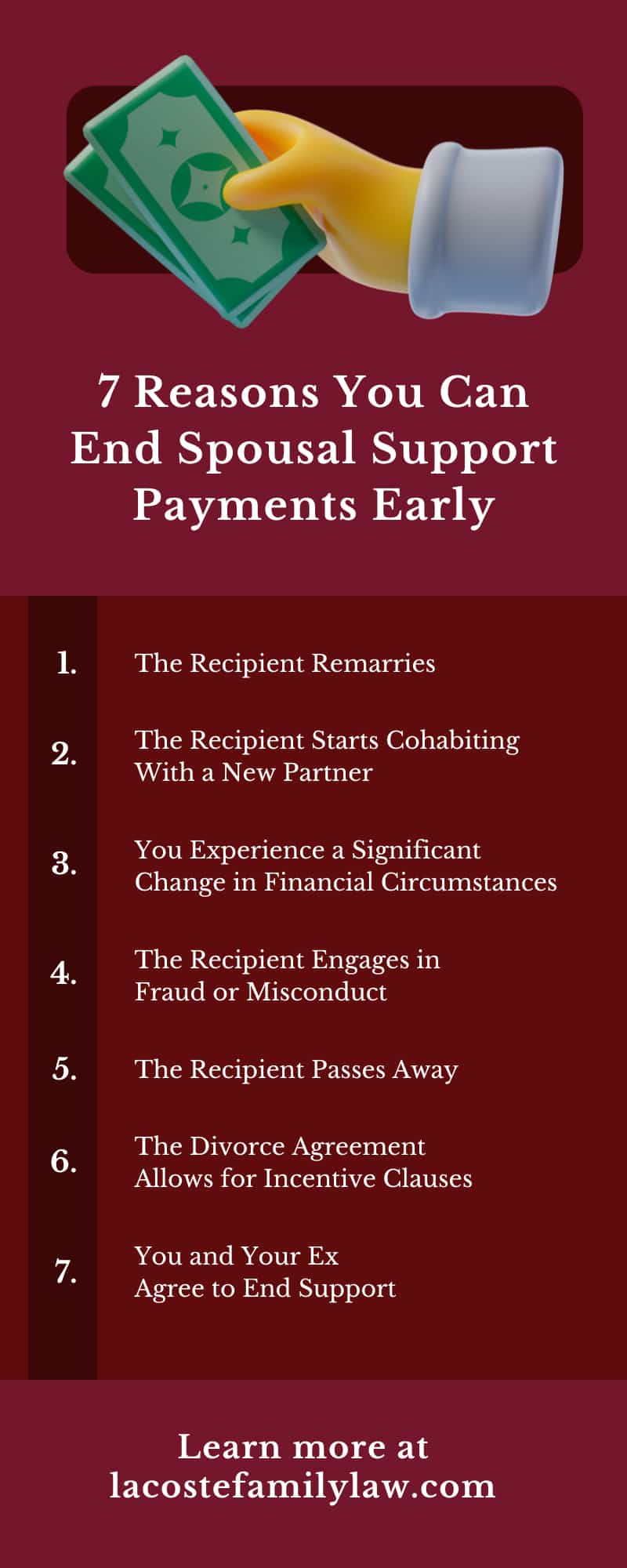
10 Mar 7 Reasons You Can End Spousal Support Payments Early
Divorce is never easy, but when it is over and the court orders spousal support or alimony, it can feel like a lingering tie to a chapter you have long wanted to close. While spousal support is an essential safety net for many, certain scenarios exist where payments might be unnecessary. Understanding these circumstances can save you time, money, and stress if you must pay alimony. Below, we explore seven reasons you can end spousal support payments early.
1. The Recipient Remarries
One of the most common reasons spousal support payments end is if the recipient remarries. Courts often view alimony to help the receiving spouse maintain financial stability after divorce. However, when they enter a new marriage, there is an expectation that their new partner will provide some level of financial support, eliminating the need for payments.
Most states in the U.S. automatically terminate spousal support when remarriage occurs, but you may need to notify the court and provide evidence of their new marriage to officially stop payments.
Keep in mind that some types of support, such as lump-sum payments, may not be refundable even if the recipient remarries. Check your divorce agreement or consult a legal professional to confirm the terms before acting.
2. The Recipient Starts Cohabiting With a New Partner
Even if your ex-spouse does not remarry, cohabitation with a new partner can sometimes lead to the termination of spousal support. Courts often recognize that living with a significant other reduces the burden of financial independence. The new partner is likely contributing to shared expenses, such as rent, utilities, and groceries, meaning your former spouse may no longer need as much, or any, financial assistance from you.
Keep in mind that proving cohabitation can sometimes be tricky. You might need evidence, such as shared leases, bank accounts, or even affidavits from witnesses. Laws surrounding cohabitation vary by state, so be sure to familiarize yourself with local regulations to determine if this reason applies.
3. You Experience a Significant Change in Financial Circumstances
It is not just the recipient’s financial situation that courts consider—your financial situation also matters. You might qualify to reduce or terminate support payments if you experience a substantial decline in income or changes to your financial responsibilities.
For example, your new financial reality may make it impossible or unreasonable to continue paying the agreed-upon amount if you lose your job because of a recent disability or medical emergency. In this case, you can petition the court for a modification, and the court may find it justifiable to review. Prepare to provide detailed documentation of your income, expenses, and circumstances to support your case.
It is worth noting that if your financial struggles stem from voluntary actions—quitting your job without cause or intentionally taking lesser-paying work—you may find it more difficult to convince the court.
4. The Recipient Engages in Fraud or Misconduct
You could petition for an early termination if you discover that your ex-spouse obtained spousal support through dishonesty or fraud. For instance, the court may agree to end payments if they misrepresented their income, concealed assets, or provided false information during divorce proceedings.
Fraud is a serious accusation and will require substantial evidence. An attorney or financial expert can help you gather the necessary documentation and present a strong case. Keep in mind that laws regarding this vary by jurisdiction, so consulting legal advice is crucial in this situation.
A local spousal support attorney well-versed in your state’s laws, requirements, and procedures can guide you in determining if your spousal support arrangement meets the qualifications for modification review.
Our experienced mily law attorney at LaCoste Family Law helps people in Washington State handle matters of spousal maintenance. Our attorney can fight for a ruling that defends your rights and suits your financial situation if you need help uncovering and proving to a court that your ex intentionally reported a lower income or hid assets to obtain higher financial support from you.
5. The Recipient Passes Away
Spousal support payments cease upon the death of the recipient. While this is an unfortunate scenario to consider, it is a legal and practical reality. You no longer have an obligation to provide financial assistance to your ex-spouse’s estate or heirs if they pass away.
Contact your legal advisor if you are unclear about the process or whether instructions are necessary to formally stop payments. Also, consider reviewing your financial arrangements, such as life insurance policies tied to spousal support, to update or cancel them as necessary.
6. The Divorce Agreement Allows for Incentive Clauses
Some spousal support agreements include clauses that terminate payments under specific conditions. These provisions might address issues such as career advancement, graduating from schooling or trade programs, , , or even behavioral changes. For example, the agreement could stipulate that if the recipient voluntarily quits a job or refuses reasonable employment offers, support ends. Have your lawyer consult your divorce settlement if you suspect the fulfillment of such conditions, as Washington State rules dictate that the original divorce terms determine potential future modifications. Clear documentation and legal guidance can help you enforce these clauses if necessary.
7. You and Your Ex Agree to End Support
Finally, one of the simplest ways to terminate spousal support is through mutual agreement. If both parties consent to ending payments—perhaps because the recipient reaches financial stability or simply no longer needs the assistance—you can work together to determine if you can modify your existing arrangement. Such agreements often require court approval to ensure fairness and legality.
Modifying spousal maintenance arrangements is not always straightforward, but understanding these seven reasons you can end spousal support payments early and your options can make the process smoother. The key is to present clear, factual evidence to the court and follow the proper legal steps, whether it is due to remarriage, cohabitation, financial independence, or changing circumstances.
Consult a family law attorney who can guide you through the process and explain your options in detail when in doubt. Each state has its own laws governing spousal support, so professional advice from a spousal support attorney is invaluable. By staying informed and proactive, you can ensure your post-divorce financial obligations are fair and reflective of current circumstances.


